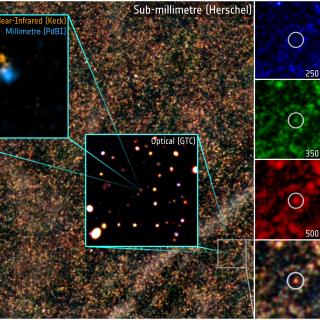Bibcode
Laporte, N.; Ellis, R. S.; Boone, F.; Bauer, F. E.; Quénard, D.; Roberts-Borsani, G. W.; Pelló, R.; Pérez-Fournon, I.; Streblyanska, A.
Referencia bibliográfica
The Astrophysical Journal Letters, Volume 837, Issue 2, article id. L21, 6 pp. (2017).
Fecha de publicación:
3
2017
Número de citas
294
Número de citas referidas
257
Descripción
We report on the detailed analysis of a gravitationally lensed Y-band
dropout, A2744_YD4, selected from deep Hubble Space Telescope imaging in
the Frontier Field cluster Abell 2744. Band 7 observations with the
Atacama Large Millimeter/submillimeter Array (ALMA) indicate the
proximate detection of a significant 1 mm continuum flux suggesting the
presence of dust for a star-forming galaxy with a photometric redshift
of z≃ 8. Deep X-SHOOTER spectra confirms the high-redshift identity
of A2744_YD4 via the detection of Lyα emission at a redshift z =
8.38. The association with the ALMA detection is confirmed by the
presence of [O iii] 88 μm emission at the same redshift. Although
both emission features are only significant at the 4σ level, we
argue their joint detection and the positional coincidence with a
high-redshift dropout in the Hubble Space Telescope images confirms the
physical association. Analysis of the available photometric data and the
modest gravitational magnification (μ ≃ 2) indicates A2744_YD4
has a stellar mass of ∼2 × 109 {M}ȯ
, a star formation rate of ∼20 {M}ȯ
yr‑1 and a dust mass of ∼6 × 106
{M}ȯ . We discuss the implications of the formation of
such a dust mass only ≃ 200 {Myr} after the onset of cosmic
reionization.
Proyectos relacionados

Formación y Evolución de Galaxias: Observaciones Infrarrojas y en otras Longitudes de Onda
Este grupo desarrolla varios proyectos extragalácticos en diferentes rangos del espectro electromagnético utilizando satélites y telescopios en tierra para estudiar la evolución cosmológica de las galaxias y el origen de la actividad nuclear en galaxias activas. En el aspecto instrumental, el grupo forma parte del consorcio internacional que ha
Ismael
Pérez Fournon